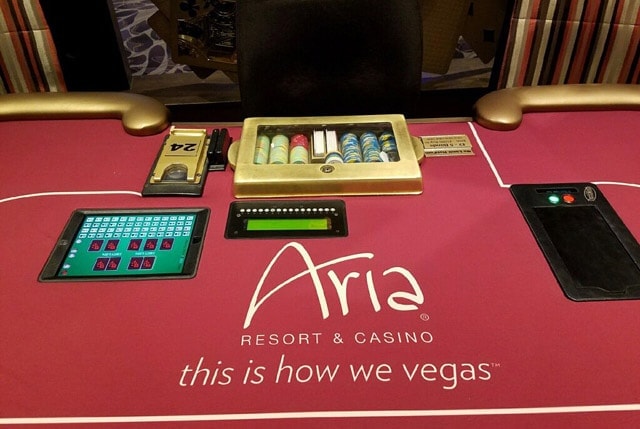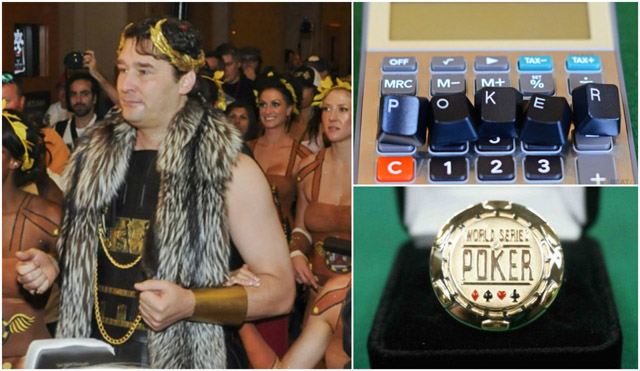
Every few months there seem to be a new idea to make poker better. While some argue that poker is fine and doesn’t need fixing, others believe that certain tweaks to the game could increase its popularity.
The latest attempt in this direction is Protection Poker, introduced to the Aria poker room in Las Vegas.
Table of Contents
Protection Poker against bad beats
Bad beats are one of the things that poker players complain the most about. Having your pocket Aces cracked by a random hand always hurts, regardless of how experienced you are. It just feels like a grave injustice even though we’ve all cracked our fair share of big pocket pairs.
But, when we do it, it’s because our opponent played it badly, right?
The latest invention introduced to the Aria poker room is nothing revolutionary, but it should lessen the pain of bad beats. Protection Poker tables feature unique rules, whereby if you are on a receiving end of a nasty bad beat you will still receive a portion of the pot.
Protection Poker rules
The special rules will kick in when at least one player is all in with more cards to come. So, players need to get their chips in the middle before the flop, on the flop, or on the turn. For the special rules to apply, the following conditions must be met:
- Betting action must come to a stop
- One player must have a statistical advantage of at least 65%
If an all-in player has an advantage of 65%+ he will be guaranteed at least 20% of the pot.
So, for example, if you get it all in preflop, with pocket Aces against pocket Queens, if there is $200 in the middle, you are guaranteed to get at least $40. If your opponent doesn’t suck out on you then you win the entire pot.
Exact equities are calculated using a physical odds calculator at the tables.
Is Protection Poker a good idea?
On the surface, Protection Poker certainly feels like a great concept. After all, good players don’t get it in bad nearly as often as “fun” players so this could have a significant impact on short-term variance. However, as some pros pointed out, there are quite a few downsides to this idea.
First and foremost, in the long run good players will always prevail over the fish. It is really a simple math and anyone who understands how poker works is well aware of this fact.
Shortening the shelf life of recs
What Protection Poker really does is shorten the shelf life (if you will) of recreational players. Within this concept, when they do get lucky, they win even less.
Live cash game @ARIAPoker with @MikeSexton_WPT playing #ProtectionPoker pic.twitter.com/Rl2NDRyDc1
— Protection Poker (@ProtectionPoker) October 20, 2016
Your initial reaction to this might be “who cares,” but I think that we all care. If recreational players get too frustrated and lose their money too quickly, they are less likely to keep playing. That’s not something a serious poker player wants to see.
Here’s the thing:
The appeal of poker is greatly based on the fact anyone can win.
You can sit across from Phil Ivey and, with some luck, take him to the cleaner’s, at least during a single session. Protection Poker effectively reduces that chance as lucky suck outs now count for less.
Is it fairer? Absolutely! As Hellmuth likes to say, if it wasn’t for luck, I’d win every one. Even if that statement were true there is one crucial detail often overlooked here.

If there weren’t for luck there would be no one to beat and nothing to win.
Professionals sharing thoughts on Protection Poker
As it is customary in today’s modern poker environment the Protection Poker debate quickly found its way to Twitter, poker players’ favorite discussion ground. The biggest argument erupted between Mike Sexton, who enthusiastically shared the new concept with the world, and David Williams.
Williams was very critical of Sexton’s support for Protection Poker, stating among other things:
I can’t believe you would support this. The most important players to the poker “economy” are the amateur or less experienced players and this system does anything but protect them.
Williams also argued that the presence of an odds calculator is definitely not good for the game, as it emphasizes the fact that an amateur player got his chips in the middle really bad. This is not what a recreational wants to see or hear about. He simply wants to get lucky and get on with his day.
A few others commenting on Twitter echoed Williams’ sentiment.
@dwpoker @MikeSexton_WPT Even as an amateur, I don’t want our games turned into “carnie” games. #wheresthebonuscoinslot
— JD Grover (@jdgrover) October 17, 2016
Of course, this is not to say that everyone hates the idea. There are also those who love the fact that they will be able to play in a game where bad beats are not as bad. Getting it in good and losing does suck a little bit, no doubt about that, but as one of those commenting aptly put it: that’s poker.
Do we need more skill vs. luck?
One of the reasons poker has lost some of its popularity is that amateur players simply can’t (and don’t really care to) keep up with the game evolution. This is particularly evident online where games have reached a point where a recreational player basically stands a zero chance to win.
#ProtectionPoker in action @ARIAPoker pic.twitter.com/0Xpg2mCeGJ
— Protection Poker (@ProtectionPoker) October 18, 2016
Poker is a skill game. It always has been and it always will be.
However, if skill is overly emphasized, it could cause amateurs to stop playing altogether. Perhaps if poker was played more for prestige and less for money (like chess, for example), that would make some sense. But, if players want to keep making money from the game, luck must remain present.
And significantly so.
Protection Poker has some sort of romantic note to it for lack of better expression. It aims to remove or lessen bad beats. But bad beats are at a very heart of the game; without bad beats we probably wouldn’t have Chris Moneymaker, the poker boom, and the game of poker as we know and love today.











I dislike this rule.
If I have AsTs, the board is KsJs4h2d, the pot is 4000, and I have 5000 left, my opponent bets 5000, to put me all in if I call.
My 5000 would represent 26% of the 19000 pot. My estimate is I’ll have 12 outs (Flush + Gutshot) giving me 26% equity in the pot, so I call.
My opponent turns over AA, so my equity is actually 27.3%.
27% of 19000 is about 5100, so my call was better than folding.
However 3800 is yanked out of the pot and guaranteed to my opponent.
Now I’m only competing for a pot of 15200.
27% of 15200 is about 4100, so I would have been better off folding.
Any rule that turns winning poker into losing poker, can’t be good for poker.
I hear you and that’s why I wouldn’t play at this type of table personally. Aside from getting bigger pocket pairs cracked it opens up all kinds of strange scenarios.
That being said, I’m sure Aria got what they wanted out of this: a bunch of free publicity.
Everyone’s always trying to figure out the next big thing with poker or innovate it in some way they can patent to profit. Just let live poker be poker.
I know it isn’t the point you’re making, which I agree with, but in your example you definitely wouldn’t be getting the right odds to make that play unless you left out a number?
If the pot is 4,000 and your opponents bets 5,000 you’ve got to make a 5,000 call on a 9,000 pot. That’s 1:8 to 1 odds when you’ve got a 27% chance to win.
Right, the original 4000 was a brain fart type typo, should have read 9000, that way, my opponent adds 5000, and I add 5000 to achieve the 19000 total I had listed.
Sure, yeah, no problem. I agree with you anyway.
The irony is that this type of setup could actually create more action since players with big hands will try to get all the money in the just to get the protection.
Or, for example, a player in early position gets pocket Aces. He raises it big pre-flop, gets a caller in middle position, and I call with pocket 6-6 on the button.
The flop is 6d-10s-Js and the pre-flop raiser just goes all-in to protect from all those apparent draws while he’s still the favorite… Except he isn’t. The middle position whiffed, folds, and I call as the favorite. I’m the one who actually gets the protection.
He gets no protection, but may have been able to save some of his money if it was a normal table and he just played it strong instead of an all-in play. Seems like it just turns into a guessing game that distracts everyone.
Just a thought.
It would seem as if No Limit Holdem is perceived as too violent when it comes to all in situations.
A possible form of “protection” might be when two people go all in, to split 1/2 the pot based on the hands equities, and the other half paid based on final outcome.
The expected value remains the same as normal, but the variance is reduced.
Haha, “too violent” reminds me of the NFL concussion saga, but it does feel that people have that mindset at times about no-limit.
Interesting idea, Mike. Seems a bit more logical than what Aria is doing here.
Honestly, I don’t have the spare brain power to think about all the possibilities and decide what’s fair or not. Just keep the game the way it is.